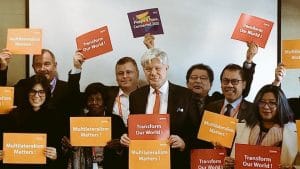UN consulted citizens in the course of 2020
In a global consultation carried out by the United Nations in the course of the previous year, citizens worldwide have overwhelmingly expressed support of international cooperation but also raised the need for the United Nations to innovate and become more inclusive.
Launched to mark the organization’s 75th anniversary, the exercise was the UN’s most ambitious effort so far to gather input from the global public. According to the UN, more than 1.5 million people from 195 countries took part through surveys and dialogues.
An overview of responses and conclusions is provided in a 96-pages report that was presented last week at the UN office in Geneva by Fabrizio Hochschild, Special Adviser to the Secretary-General on the commemoration of UN’s 75th anniversary.

Immediate priorities and long-term concerns
The consultation covered priorities for recovering from the COVID-19 crisis, perception of threats and challenges across the world, long-term priorities for “the future we want” and views on international cooperation and the United Nations.
Amid the pandemic, the immediate priority for most respondents was improved access to basic services such as healthcare, safe water, sanitation and education, followed by greater international solidarity and increased support to those hardest hit.
Overwhelming concerns identified through the consultation are the climate crisis and the destruction of the natural environment. Other priorities included ensuring greater respect for human rights, settling conflicts, tackling poverty and reducing corruption.
Belief in international cooperation but little knowledge about the UN
The report says that 52% of respondents believe that international cooperation is essential for addressing global challenges, 34% believe it is very important and another 11% it is fairly important. Only 3% said that it is not important or not important at all.
In an Edelman survey commissioned for the consultation, carried out in 36 countries, an average of 74% agreed that the UN “is an essential organization for helping tackle the biggest issues the world faces today” and 62% confirmed that it has made “the world a better place”.
The report points out, however, that four in ten respondents said that they know little or nothing about the UN and see the UN “remote from their lives”.
Independent from the UN75 consultations, recent figures published in November 2020 from the seventh wave of the World Values Survey, one of the world’s broadest academic projects exploring the long-term development of global public opinion, offer a mixed picture. Asked about their confidence in the UN, an average of 45.6% across 74 countries responded that they have “not very much” or “none at all”. However, 50.8% also agreed that the UN “overall is competent and efficient”.
In another recent survey not related to the UN’s campaign, carried out in ten countries across world regions, an average of 77 percent agreed that the UN needs to be reformed in order “to better manage global risks”.
The United Nations needs to innovate and become more inclusive
According to the UN75 report, “hundreds of thousands of participants in more than 3,000 UN75 dialogues held across the world called on the United Nations to innovate and change the way it works.”
It says that some of the most frequently shared and key ideas offered by dialogue participants to renew the UN included stronger moral leadership of the UN, making the UN Security Council more representative, re-consideration of the veto power of permanent members, convening a global intergovernmental conference “to reformulate key aspects and mechanisms of global governance” and improving the participation of non-governmental groups and stakeholders, among other things.
A UN Parliamentary Assembly and a UN World Citizens’ Initiative
The UN75 report elaborates on the proposals of a UN Parliamentary Assembly and a UN World Citizens’ Initative promoted by Democracy Without Borders and a broad spectrum of civil society organizations from across the world. For instance, both proposals were endorsed in the UN75 People’s Declaration adopted in May 2020 as a common platform of global civil society or put forward by CIVICUS board chair Julia Sanchez at a high-level meeting organized by the UN’s Economic and Social Council in July 2020.
Specifically, the UN75 document observes that “The UN can be further democratized through other reforms, such as establishing a UN parliamentary assembly as a subsidiary body of the General Assembly under article 22 of the Charter, or introducing a ‘citizen proposal initiative’ to the UN General Assembly or other permanent consultation tools.”
Further, in a section on an “inclusive and participatory UN system”, it is said that “UN bodies and offices and the UN Secretariat should work to enhance the comprehensive participation of citizens and local communities in the decision-making and policy-formulation processes. Online platforms and annual dialogues should be promoted for this objective. A parliamentary assembly representative of the voice of the people could be established to serve as the citizens’ advisory body to the General Assembly.”
Democracy Without Borders’ Executive Director Andreas Bummel commented that it was now high time for the UN and member states to seriously consider these proposals. “The UN75 consultations confirm once again that citizens want this to be done”, he said.




